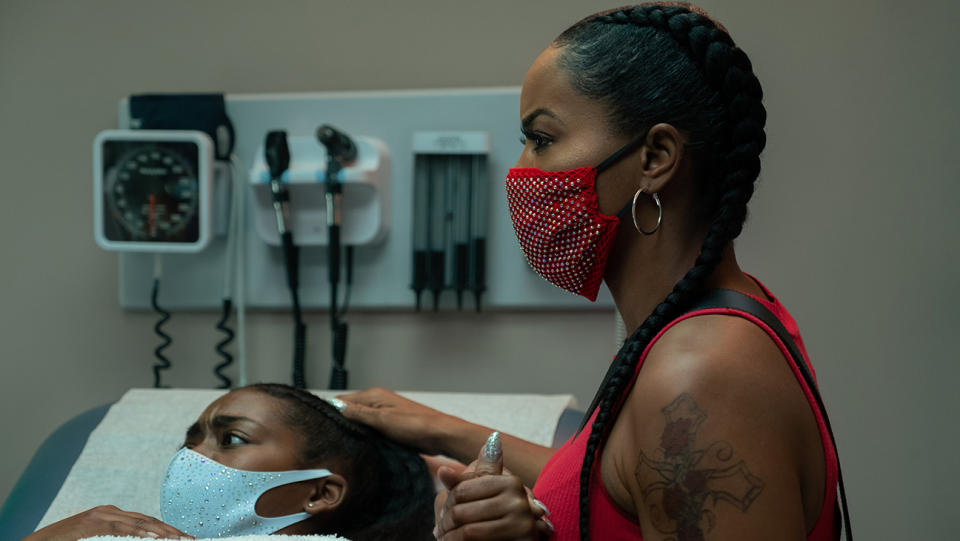Guest Column: ‘P-Valley’ Creator Calls on Other Showrunners to Depict Abortion
- Oops!Something went wrong.Please try again later.

“All them pro-lifers only be pro-life ’til the baby be born,” quips Mercedes (Brandee Evans) as she ushers her pregnant 14-year-old daughter, Terricka (Azaria Carter), past fuming protesters at the only abortion clinic in all of Mississippi. A crowd spewing forth hatred and judgmental prayer while holding Black Lives Matter signs flanks an entrance that, for this little Black girl, feels an ocean away. It is a walk of hope made shameful, and until recently, a path toward choice. On July 6, 2022, the only abortion clinic in Mississippi closed its doors in the wake of the Supreme Court ruling of Dobbs v. Jackson Women’s Health Organization, putting a woman’s once constitutional right to an abortion in the hands of 50 states.
As true to life as the vignette above feels, it is actually a truthful lie — as all art is. Pulled from the July 24 episode of P-Valley entitled “Jackson,” this scene is a testament to how the world of today can soon become the world of yesterday. “Jackson” follows Mercedes —The Pynk’s OG headliner — as she guides her daughter in making one of the biggest decisions of her young life. They embark on a road trip from their fictional town of Chucalissa in Northern Mississippi to the state’s capital to attend a consultation at a women’s clinic. Along the way, this mother and daughter pair discuss the options available, while reopening old wounds in order to build a new future. While never explicitly named in the show, the obvious inspiration of the clinic was “The Pink House” or Jackson Women’s Health Organization, whose real-life legal battles waged with the state of Mississippi set the stage for the overturning of Roe v. Wade.
More from The Hollywood Reporter
Guest Column: Why Individual Stories Get Lost in the Fight for Abortion Rights
Directors Guild Scales Up Health Plan Coverage for Abortion Services
Guest Column: I Had a Pre-Roe Illegal Abortion. We Can't Go Back
When the P-Valley writers’ room convened for its second season in late 2020, we collectively took up Nina Simone’s mantle that an artist “must reflect the times.” We plumbed our reality, weaving in the pandemic caused by COVID-19, a virus, which also exposed a more rampant virus of racism and police brutality still plaguing our nation.
From season one, we searched for a way to tell a story about the limited and restrictive reproductive rights in Mississippi, which was one of only five states with just one abortion clinic. We felt it our responsibility to depict the war on Black women’s bodies raging in this conservative state. This season, we explored this complicated and highly emotional issue through the lens of a fractured mother-daughter relationship. We learn that as a teenager Mercedes was forced by her own mother to have Terricka and to relinquish custody of her, the source of their fraught bond. Mercedes struggles to give Terricka the gift of choice which was denied to her.

Courtesy of Starz
Much like Terricka, I’m a Black girl from the South, who was taught to keep my legs closed and wait until marriage to have sex. These unrealistic demands of abstinence, coupled with a lack of sex education and rampant misinformation about reproductive health result in devastating statistics — Mississippi has the highest teenage pregnancy rate in all of America.
To live this American life in this body, at the intersection of race, class and gender, can feel like a gift and burden all at once. The stories I have inside of me are plentiful, and I am thankful that as a storyteller I have the platform to create empathy where law and policy have failed. In P-Valley we have placed viewers in the wobbly platforms of strippers as they attack the pole of life, rising and falling as they try to crash through distant ceilings imposed by society.
In “Jackson” we place viewers in the sneakers of a little Black girl faced with a difficult decision. We feel her pounding heart as she walks past faces of rage and judgment. We hope that perhaps then people will understand that this is not an easy decision for any woman or girl to make. And yet, it must be hers to make.
Story has the ability to create compassion and care in hearts closed off by politics, especially for Black and brown women who will be disproportionately impacted by this legislation. As we move into this precarious next chapter in American history, I call for more storytellers to reflect these times — the challenges, the truth and the hope because there is hope. In some ways, the yesterday of Mississippi might have been a bit better for women than the Mississippi of today, but with renewed fight we can — like Mercedes — hold space for our daughters to make their own choices for their lives in the Mississippis of tomorrow.
Katori Hall is the creator, executive producer and showrunner of the Starz drama P-Valley. She won the Pulitzer Prize for drama for writing the 2020 play, The Hot Wing King. Her play, Tina: The Tina Turner Musical, earned 12 Tony nominations and one win in 2020.
Best of The Hollywood Reporter

